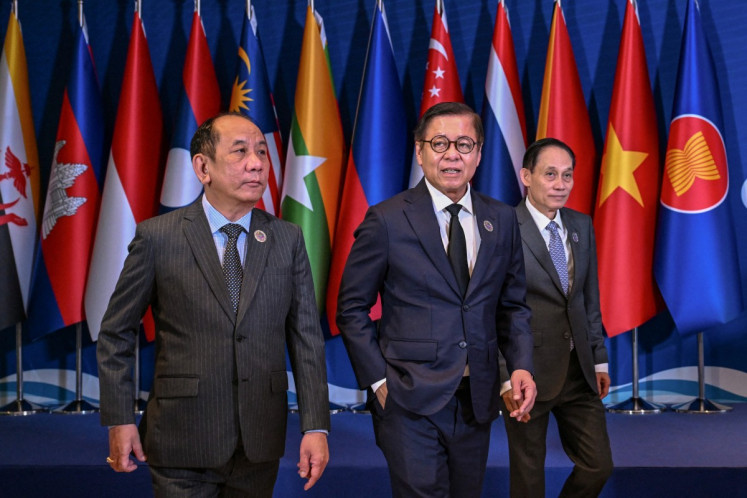Popular Reads
Top Results
Can't find what you're looking for?
View all search resultsPopular Reads
Top Results
Can't find what you're looking for?
View all search resultsAnalysis: WB slashes RI’s growth outlook, casting doubt on Prabowo’s ambition
Change text size
Gift Premium Articles
to Anyone
 Merchants and buyers pack the Tanah Abang Skybridge that connects the railway station to the famous Tanah Abang textile market in Central Jakarta . Indonesian economic growth slowed in the second quarter despite the increase in household spending ahead of Idul Fitri in June this year. (The Jakarta Post/Dhoni Setiawan)
Merchants and buyers pack the Tanah Abang Skybridge that connects the railway station to the famous Tanah Abang textile market in Central Jakarta . Indonesian economic growth slowed in the second quarter despite the increase in household spending ahead of Idul Fitri in June this year. (The Jakarta Post/Dhoni Setiawan)
T
he World Bank has revised down its forecast for Indonesia’s economic growth in 2025 to 4.7 percent year-on-year (yoy), below the psychologically significant 5 percent threshold, from a previous estimate of 5.1 percent. The bank also downgraded Indonesia’s average growth projection for 2025–2027 to just 4.8 percent, a notable drop from the 5.1 percent average it projected in October 2024 for the 2024–2026 period. This downward revision raises serious questions about the feasibility of the Prabowo Subianto administration’s goal to achieve 8 percent annual GDP growth by the end of his term.
In its latest Macro Poverty Outlook report, the World Bank attributed the cut to multiple headwinds, including global economic uncertainty and weakening prices for Indonesia’s key export commodities such as coal and nickel. In addition to external pressures, the report flagged concerns over domestic policy uncertainty, both of which have contributed to capital outflows and downward pressure on the Rupiah.
President Prabowo has envisioned an economy propelled by ambitious state-led programs, including free school meals, food estates, defense manufacturing and large-scale infrastructure development. However, 2025 has so far been marked by tighter fiscal policy, not expansion.
Much of the government’s economic ambition is tied to the broader Golden Indonesia 2045 Vision, a national long-term strategy to transform the country into a high-income economy by its centenary year. President Prabowo has repeatedly linked his target of achieving 8 percent annual GDP growth to the success of that vision. His administration argues that such rapid growth is essential not only to expand Indonesia’s fiscal space, but also to tackle long-standing issues such as inequality, youth unemployment and lagging industrialization. However, critics have pointed out that without structural reforms, including tax base expansion and improved policy consistency, the 8 percent becomes more of an aspiration than an actionable plan.
The government’s fiscal ambitions hit a wall early into 2025, forcing an “efficiency” measure in February which significantly cut the allocated state budget across various ministries, including those responsible for public works, agriculture and defense procurement, ironically, some of the very sectors that were expected to drive Prabowo’s economic transformation agenda. Despite campaign promises centered around bold, stimulus-driven government intervention, the administration has instead opted for tighter fiscal discipline in response to declining revenues and rising debt-servicing costs.
The World Bank took note of this fiscal shift. Its April 2025 Macro Poverty Outlook report projects government expenditure to stagnate through 2027. It slashed its projections for government consumption growth from 4.2 percent (2025) and 3.9 percent (2026) in its October 2024 outlook to a -2.1 percent contraction in 2025 and only 0.3 percent growth in 2026.
The recent state budget report has reinforced these concerns. The Finance Ministry reported a budget deficit of Rp 104.2 trillion (US$6.27 billion) last March, equal to around 0.43 percent of the GDP for March 2025. As a basis for comparison, the state budget reported a surplus of Rp 8.1 trillion last year, equal to about 0.04 percent of the March 2024 GDP.


















